
In This Guide:
- What is the best programming language to learn in 2025?
- What are the best programming languages for specific careers?
- What’s the best programming language for web development, web design, and web apps?
- What’s the best programming language for Game Development?
- What's the best programming language for Machine Learning and Artificial Intelligence?
- What's the best programming language for Data Science?
- What's the best programming language for Robotics?
- What's the best programming language for Blockchain?
- What's the best programming language for Finance?
- What's the best programming language for Cybersecurity?
- What's the best programming language for IOT Development?
- What's the best programming language for Cloud Computing?
- What's the best programming and scripting languages for DevOps?
- What's the best programming language for Business Analytics?
- What’s the best programming language now that AI can help write code? (And is it even worth learning to code?)
- It’s time to start learning!
With so many options available and so many factors to consider, picking a programming language to learn can be hard work:
Which is the best choice for the next step in your career?
Which is best if you’re a complete beginner?
Which pays the most?
Which has the most jobs available and opportunities?
Which is used by cutting edge industries and ‘future proofed’ against changes?
Or simply - which is the best one for your particular career choice? Be it Web Development, Cyber Security, DevOps, etc
Since these are the types of questions I get from students] every day, I created this guide to help you out. (And I update it every year 😉).
Not only do I answer every question above and give a solid reason behind each one, but I also give you my picks for the best resources to learn each programming language on this list.
However, this guide is different from other similar posts or videos you might read on the topic.
Mainly because:
I give you an objective (as much as possible) data-driven approach and dive into the numbers behind why I think you should learn any of the languages shared
But then I also provide my subjective opinions and thoughts based on my many years in the industry. (I’ve helped over 100,000+ people learn to code and get hired since 2018!)
So let’s dive in…
What is the best programming language to learn in 2025?
Ok, gun to my head, (and if you gave me no other context of your needs), then I’d tell you that Python is the best programming language to learn in 2025 followed by these other languages:
Python 🏆 (best option for 2 years in a row)
JavaScript (with TypeScript)
C++
Ruby
PHP (It’ll never die!)
That’s right. We’re so impartial, we even have languages on here that we don’t teach!
But you’re probably thinking “Why these 10 and why this order? And why is Python the winner? And why is PHP up there?”
Well, to help us narrow down all of the programming language options available, me and my fellow ZTM instructors came up with this list based on the following 5 criteria:
Job demand
Salary potential
Difficulty to learn
Ease of use / developer satisfaction
Futureproofability (this might be a made up word, deal with it)

Criteria 1. Job demand
Most people don't have the time to learn a programming language just for fun. They’re learning it because they want to get hired.
So with this in mind, we made sure that each language on our list had at least 1,000 US based jobs currently available on a single job hosting platform (we used ZipRecruiter). That way you can be sure that there’s a lot of job opportunities available and you’re not struggling to get hired.
Which programming language is best for getting a job in 2025?
If you just want to get hired, then Python has the most job openings of any other language on this list:
Python had 108,177 open jobs, up from the 84,500 it had available last year
Then we have JavaScript/TypeScript at 59,327
And then SQL with 76,097 open jobs to round out the top 3
See the full chart below.
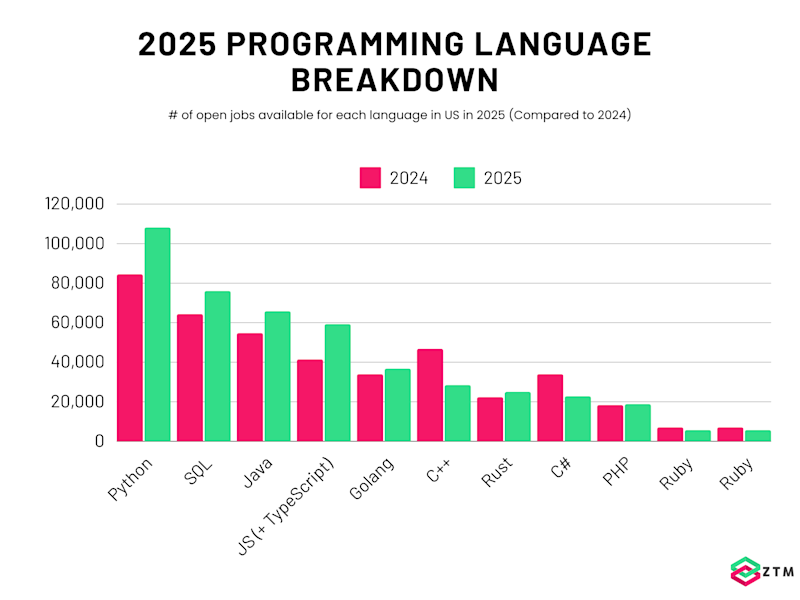
You’ll notice that almost every language on this list has seen an increase in job openings since we wrote the 2024 edition last year, with Python in the lead for both years. The only two languages with a drop are C++ and C#.
Criteria 2. Average USD salary of current job postings
Let’s be honest here - making a good income is one of the major reasons why most people are initially interested in becoming a programmer and learning to code. We all want that 6 figure salary and tech bonuses!
So to get on this list, we only included a language if the open jobs available had an average salary over $100,000. This way you know there’s good money to be made.
What programming language makes the most money?
At the time of writing, Ruby has the highest average salary on our list, at $134,186 per year.
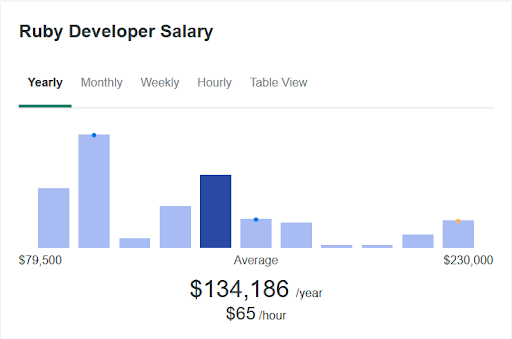
It’s a little skewed with some very high senior salaries bumping up the average at 230k a year. However, if we look at the average salary for each of the languages on our list, we see a fairly even spread:
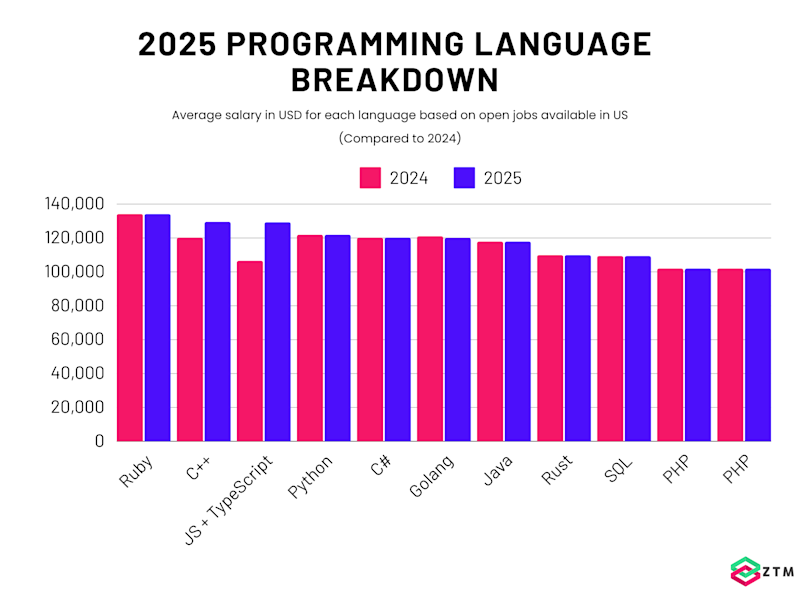
Of course, how much you’ll make will depend on whether you’re learning your very first programming language or if you’re an experienced developer looking to transition into a new role or opportunity.
Also, if you are a beginner, you should know that it's unlikely that you’ll make the average salary right away if you’re applying for entry-level jobs. From my experience though, there’s no reason why you shouldn’t be able to earn the average salary within 1-3 years if you work hard and play your cards right.
Important: This is why I wouldn’t base your decision of what language to learn too heavily on average salary alone. You can earn a great income from learning any of these, which is why we’re also weighing up these other criteria to help us choose.
Criteria 3. Learning difficulty
It doesn’t matter if you’re a beginner or an expert, some languages are just more difficult to learn and use than others. However, there’s no real way to be objective about this criteria. What I might enjoy, others might hate etc.
So rather than just give my own opinion - I also asked my fellow ZTM instructors and we broke this list down into groups.
What is the easiest programming language to learn?
The easiest programming language to learn is SQL so it’s in a group on its own.
Easiest: SQL
Easy: Python, JavaScript Ruby, PHP
Moderate: Typescript, Rust, Golang
Hard: Java, C#
Hardest: C++
Also don’t be scared by the ‘hard’ and ‘hardest’ choices. In all honesty, none of the languages on this list are super difficult to learn. We just needed a way to differentiate the difficulty so although they are classified as ‘hard’, they’re not much harder - especially if you have the right resources to learn from.
In fact, if you already know a programming language then Rust and Golang will be easy for you to pick up. Likewise, although we’ve classified Java and C# as ‘hard’ to learn, they both have huge ecosystems and great resources out there to help people so you’ll never get stuck.
Why are JavaScript and TypeScript in different groups?
You might be wondering — if JavaScript and TypeScript are grouped together on the main list, why are they in different difficulty categories?
Here’s the simple reason:
JavaScript is a language you can learn and use on its own. However, TypeScript isn’t technically its own language. It’s a “superset” of JavaScript, which means it’s basically JavaScript with extra features like static typing, interfaces, and generics.
So, why the different difficulty ratings?
JavaScript is "Easy" because it’s one of the most beginner-friendly languages. The syntax is straightforward, and you’ll find endless tutorials, courses, and community support
TypeScript is "Moderate" because it adds extra "rules" to your code. Concepts like types, stricter error-checking, and interfaces force you to think more carefully when you write. It makes large projects more reliable but also requires you to approach coding in a more structured way
The good news? If you already know JavaScript, TypeScript feels more like a natural upgrade than a new language to learn from scratch. You’ll be building on what you already know, not starting over.
What is the best programming language for beginners?
Even though I just told you that SQL is the simplest language to learn, it’s not the best option for beginners. Instead, you’re better off learning JavaScript if you want to go into Web Development or Python if you want to move into a more data focused career like Machine Learning or AI
Why?
Well, although they’re both not quite as easy to learn as SQL, ‘high level’ languages such as Python and JavaScript are both pretty easy to understand and pick up quickly. Not only that, but they open up so many other career options whereas SQL is data management focused.
They’re also the core languages you’ll need for other frameworks and tools as you advance.
Criteria 4. Do other developers enjoy using the language?
Not all programming languages are created equal. Some are notoriously frustrating, while others are newer and have a better focus on developer user experience.
Since you’re going to be using the language A LOT, it’s definitely worth considering this factor when picking a language to learn and use, because it would suck to pick a language only to want to pull your hair out every day at the thought of going to work!
For this particular selection criteria, we used the user experience data from last years StackOverFlow Developer survey.
In that study, they asked each of the respondents to share their ‘most admired and desired’ programming languages:
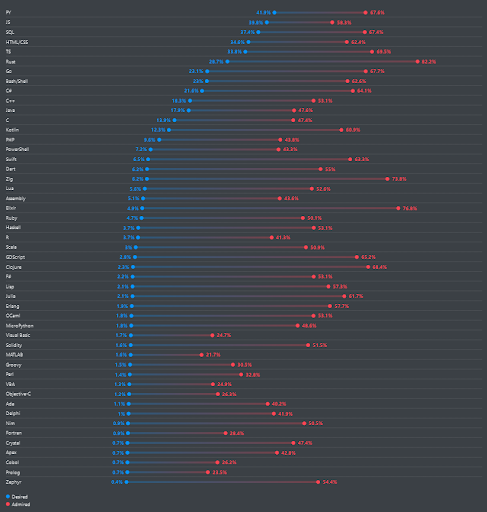
Basically:
The red line is most admired. This means that people currently use the language and what percentage of them like it and what to keep using it
While the blue line is most desired. This is the percentage of people who don’t use that language but want to in the future
We focused on the red line (most admired) because we only really only care whether people are enjoying using a language. If they like it, then there’s a good chance that you will too!
What are the most loved programming languages to use?
For a number of years now, Rust has been the most loved programming language with 82.2% of users stating that they enjoy using it. Given the developer experience played a big part in the design of the language, this makes total sense.
After Rust, we have JS (+ TypeScript) at 69.5%, and then Golang at 67.7%
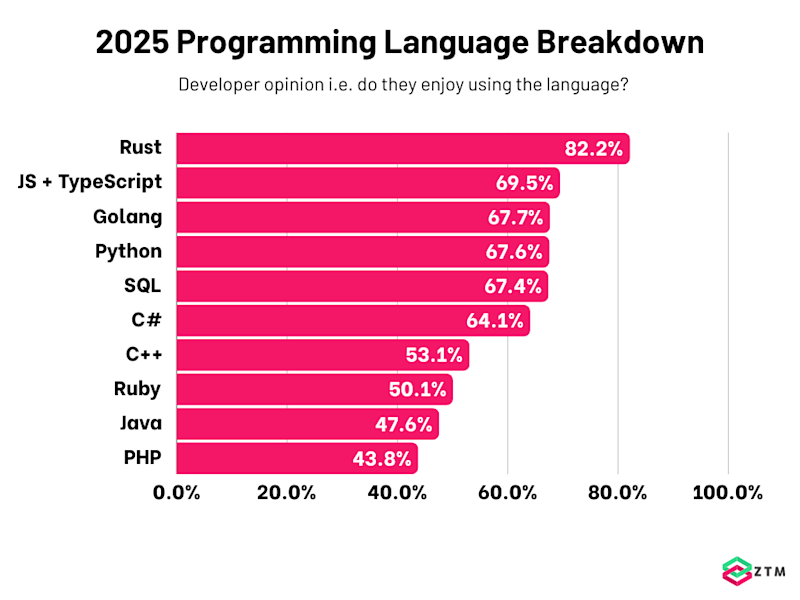
Then in 4th place we have Python at 67.6% of users stating they enjoy using it - even though it's been around way longer than the top 3!
Criteria 5. Will the language still be relevant in 5-10 years?
If you’re going to spend all the time and effort to learn a programming language, you want to make sure it isn’t going to be irrelevant in the next couple of years.
So the last criteria we have is how future-proof it is, and we tried to answer questions like:
How/where is the language being used?
Are large companies using it?
How embedded into existing systems is it?
What's the 5-10 year outlook? Will this language still be widely used and therefore a valuable skill to have for years to come?
What kind of projects is the language being used for?
To measure this, we combined 3 sources:
#1) We included some gut feel here based on our general industry knowledge and the fact that our team stays up-to-date on the latest industry news (we do write 3 newsletters every month after all, and have been since 2018!)
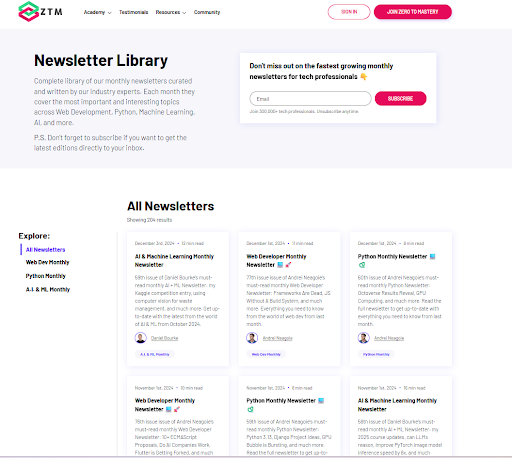
#2) Then we looked at the Tiobe index.
This is a popularity tracking chart of programming languages based on their usage, volume of searches along with a few other things over time.
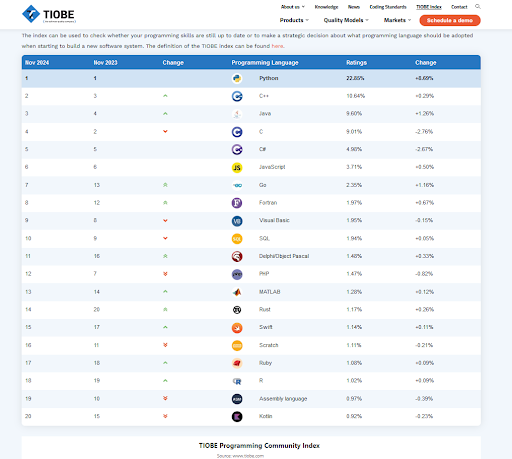
#3) Finally, we looked at the pull requests for specific languages in GitHut 2.0 for the first quarter of 2024.
Based on the number of rising or declining requests, we can get a rough approximation for the popularity of that language for last year, and use that to help see the coming trends.
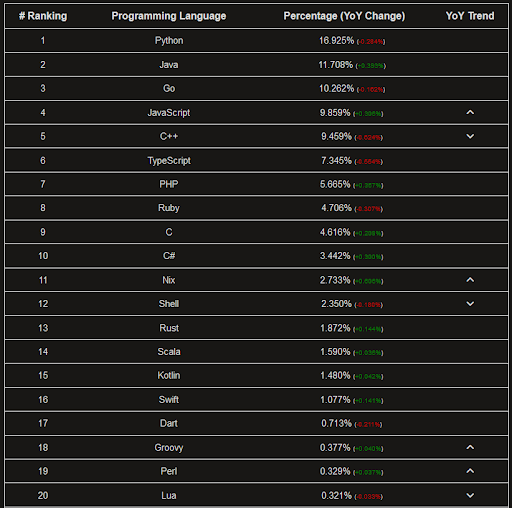
All of this combined helped us to rank how ‘future proof’ each language on our list is.
Then we organized each language into a bucket from the highest confidence we have in the language being future-proof, to the lowest confidence we have.
Highest = most confidence that the language is future-proof
High
Medium
Low
Lowest = least confidence that the language is future-proof
What’s the best programming language for the future?
Python is the clear winner here thanks to its usage in both Machine Learning and Artificial Intelligence. Both industries are growing like crazy and Python is at the foundation of all of it.
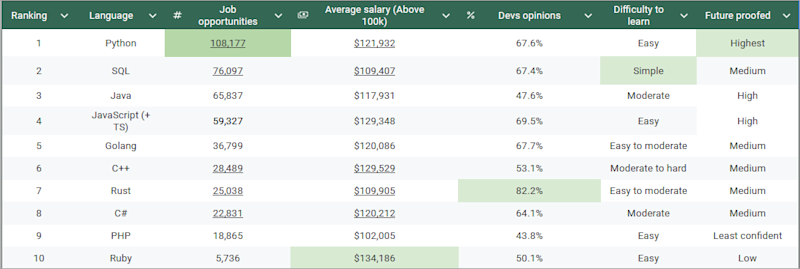
After Python, we ranked JavaScript (+ TypeScript) and Java as high future confidence.
This is because:
JavaScript is still the heartbeat of the internet as we know it, with TypeScript taking JS one step further
While Java is integrated into enterprise software development, Android app development, and backend systems
Again though, every language on this list is worth learning depending on your personal situation and goals. Even the older or declining languages are so entrenched in large systems that there's very little chance they'll be totally irrelevant over the next 5 years unless something drastic happens.
For example
PHP is still on this list (2 years running now) mainly because it’s used so much with WordPress. (If you didn’t know, 43.2% of all websites are built on top of WordPress).
This is why there are currently 18,865 PHP jobs available in the US with an average salary of $102,005.
So even though it seems like an old and outdated language, there’s ongoing work, security and a good salary. However, it’s lowest on the list when you compare it to the languages used in multiple fields as well as cutting edge tech.
TL;DR - Learn Python if you’re not sure what to learn this year
So as you can see, when we consider our 5 criteria, Python is the clear winner that comes out on top. Highest number of jobs, great salary, future proofed, people love it and keep using it.
After that, the list breaks down like so:
Python - Start learning Python for free here
JavaScript (with TypeScript) - Start learning JavaScript for free here. Then start learning TypeScript for free here
Golang - Start learning Golang for free here
C++
Ruby
What are the best programming languages for specific careers?
That doesn’t mean the other languages on this list aren’t worth learning - it’s just that Python is the best option if you have no external criteria.
But if you’re looking for a specific career path like Web or App Development, then you might never even use Python, and will almost definitely use another language on this list (and possibly others that are missing due to being so niche).
So let me give you some examples. This way if you still have no idea what to learn, but you have a feeling of a career you want to get into, you’ll then know the best language to learn.
What’s the best programming language for Web Development, Web Design, and Web Apps?
Although only 6th on our overall list, if you’re mainly interested in building websites and web apps (and becoming a web developer) then learning JavaScript is still my top recommendation. You can then add onto that with TypeScript or frameworks and go full-stack.
If this is the direction you want to go, I wrote a step-by-step guide on how to become a full-stack web developer with links to learning resources.
What’s the best programming language for Game Development?
There are two main game development platforms, Unity and Unreal Engine,
C# powers the Unity Game Engine
While C++ is used with the Unreal Engine
My recommendation would be to research roles and companies to see which platform they’re using, and then base your decision on which core programming language to learn based on that research.
Here’s a step-by-step guide on how to become a game developer.
What's the best programming language for Machine Learning and Artificial Intelligence?
As I’ve mentioned already, Python is the clear leader for machine learning and AI. Its extensive libraries like TensorFlow, PyTorch, and Scikit-learn make it beginner-friendly and powerful for everything from predictive analytics to deep learning.
Check out this step-by-step guide of what to learn first, and in what order, to become a Machine Learning Engineer in 2025.
What's the best programming language for Data Science?
For data wrangling, visualization, and advanced statistical modeling, Python and R dominate.
Python shines for automation and machine learning (which is a core component of data science)
While R is commonly used for statistical analysis and visualization
Both languages have incredible libraries like Pandas (Python) or ggplot2 (R), making them essential tools for data professionals. Combine these with SQL for querying databases to become a versatile data analyst, data scientist or data engineer!Not sure of the difference between these three roles? Check out this guide.
What's the best programming language for Robotics?
C++ and Python share the crown in robotics.
C++ is the go-to for real-time performance and hardware-level control
Python excels in quick prototyping and AI integration
For frameworks, explore ROS (Robot Operating System), which supports both languages and is widely used in robotic development.
What's the best programming language for Blockchain?
Solidity is essential for building smart contracts on platforms like Ethereum. If you're working on blockchain infrastructure, Rust and Go are excellent for creating high-performance, secure systems.
For enterprise solutions, Java is often used in blockchain projects requiring scalability and integration with existing systems.
What's the best programming language for Finance?
Python leads the charge in fintech thanks to its ability to handle complex calculations, data analysis, and integrations with APIs.
Libraries like NumPy and Pandas are perfect for financial modeling, while frameworks like Django streamline building financial applications. For high-frequency trading systems or performance-critical tasks, C++ is a popular choice.
What's the best programming language for Cybersecurity?
Python and C are the most critical for cyber security.
Python is used for writing scripts, automating tasks, and analyzing data in penetration testing
While C helps you understand system vulnerabilities and secure software at the operating system level
For advanced professionals, consider learning Assembly also, as this can provide insights into reverse engineering.
What's the best programming language for IOT Development?
IoT developers rely heavily on C and Python.
C is used for firmware and low-level programming on devices
Python is ideal for handling data and building integrations
As IoT scales, JavaScript with Node.js is becoming more popular for creating IoT applications that require cloud connectivity.
What's the best programming language for Cloud Computing?
Go and Python stand out for cloud computing.
Go’s speed, concurrency support, and ability to build scalable systems make it a favorite for cloud-native applications
While Python’s wide use in DevOps and automation makes it a strong contender for scripting and infrastructure as code (IaC)
You’ll also need tools like Terraform and Kubernetes to enhance your cloud computing skillset.
What's the best programming and scripting languages for DevOps?
For DevOps, the top languages to learn are:
Python: Powers CI/CD scripts, API automation, and testing
Bash: Essential for shell scripting on Unix/Linux servers
Go: Used to build lightweight internal tools and interact with Kubernetes
These languages help automate workflows, manage CI/CD pipelines, and control system configurations. Mastering them allows you to work more efficiently with tools like Docker, Jenkins, and Kubernetes.
Learn how to become a DevOps Engineer step-by-step in this guide.
What's the best programming language for Business Analytics?
Python, SQL, and Excel VBA are the staples for business analytics.
Python handles large-scale data processing and machine learning tasks
While SQL is indispensable for querying databases and analyzing structured data
And VBA allows for quick, tailored automation of repetitive tasks
Combine these skills to offer a full-spectrum analytics toolkit.
What’s the best programming language now that AI can help write code? (And is it even worth learning to code?)
I’ve covered this before in a lot of detail, but here’s the overview. No, AI won't take your job. But people who learn how to use AI who are also good coders, will be the best candidates. They are the people who will get hired over others.
This means that you will need to learn AI as well as a programming language if you want to stay ahead, and this is becoming true for almost any blue collar industry.
That being said, it’s not enough to be good at the tool and bad at coding. This is because the tools are not that great. They can’t do it all on their own - it just looks like they can. So when you rely on the tools instructions for code, but lack core coding skills and experience, you’ll struggle and the code will fail.
However, if you learn to code first, and then use the tool like an assistant - helping you to work quicker with your own expertise and oversight - then you’ll get work done faster and easier. This is why there’s now a growing trend of devs polishing up their core fundamentals (i.e. data structures and algorithms, system design, understanding and applying mental models) etc.
TL;DR: You can apply AI to any language. Just make sure you learn the language first if you want to be able to do this effectively.
It’s time to start learning!
Phew! Hopefully that answers all your questions and you now know the best programming language for you to learn in 2025.
If you’re open to any language, then Python is your best bet
If you want to get into a specific career like Web Dev then start with JavaScript. (And then add on other tools like TypeScript as you get more experience)
For any other careers check these career paths here. They’ll go into what to learn first, and in what order so you can get hired asap or simply take the next step from where you are now. (And if you’re still not sure what career would be best for you, then take our career path quiz to find out).
Every language on this list will do you well. All you need to do is pick one and learn, so get started today!
P.S.
We teach around 99% of the languages recommended on this list, and you can get access to all of them (every language, framework, tool, career path, etc) all in a single Zero To Mastery Academy membership.
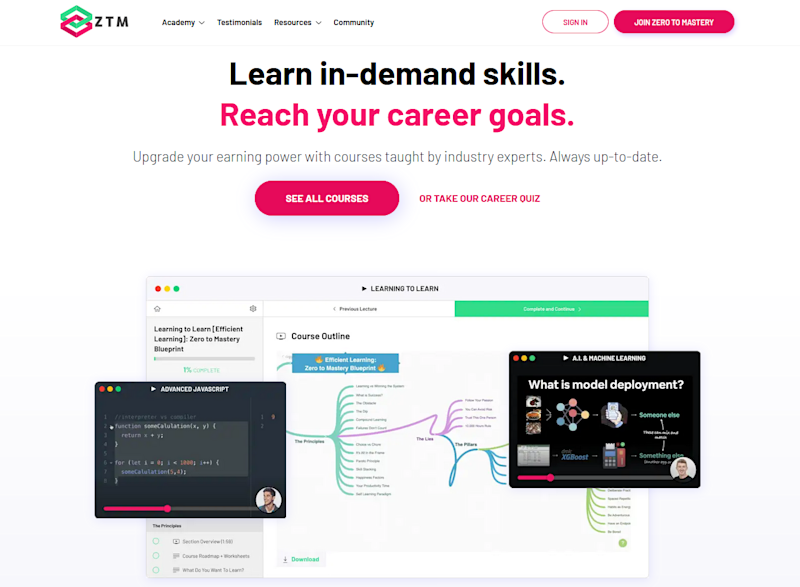
This means you can learn everything you need all in one place.
And better still, we have a thriving community of students, professionals, and course teachers that you can join once you become a member.
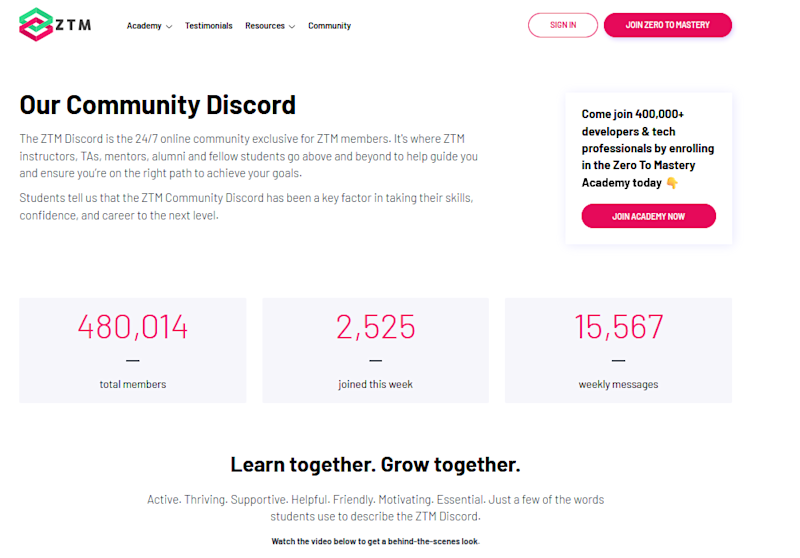
This means you can ask questions 24/7, and get help and support - regardless of your current experience level.
Best articles. Best resources. Only for ZTM subscribers.
If you enjoyed Andrei's post and want to get more like it in the future, subscribe below. By joining over 300,000 ZTM email subscribers, you'll receive exclusive ZTM posts, opportunities, and offers.
No spam ever, unsubscribe anytime









